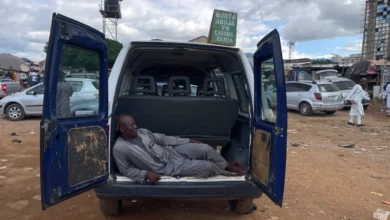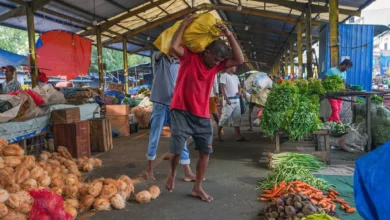While various groups in Egypt have been clamoring to have their say and influence the future of their country, one group has remained as voiceless as ever: street children.
There are an estimated 150,000 to 2 million street children in Egypt with the number varying widely depending on how the children are classified.
Besides navigating perils like crime, violence, rape, drugs and prostitution on a daily basis, the children are also regularly rounded up and arrested by the police, sometimes for a crime such as pickpocketing and sometimes for the crime of being prone to delinquency.
“The police have quotas of children to arrest, the same way they have quotas for tickets to give,” said Alia Mossallam, who has researched the topic extensively for both UNICEF and Human Rights Watch.
Some children have cut deals with the local police to check in once a month as though they have been arrested, according to Mossallam. Most, however, are just detained for several days, often in cells with hardened criminals who abuse them.
The police themselves are also accused of abusing the children, forcing them to pose as drug dealers or prostitutes in sting operations. They are threatened with “police parties,” gang rape by all of the officers on duty, if they do not comply, said Mossallam.
“One example is that the police appoint children to work as guides or spies to report on any fugitive, any drug deals or thug congregations,” said Soheer Wahid, a social worker at the Banati Foundation, an NGO that serves street girls. “Girls in particular are used to frame those suspects in crimes such as sexual abuse, theft, swindling and begging.”
Ramadan, a soft-spoken boy who comes to a reception center in Sayeda Zeinab run by Hope Village Society, an Egyptian NGO that assists street children, does not know his age but says he tells people he is 8. He says he has been arrested four times so far, both before and after the revolution, for playing in the street.
“Right when the guy said ‘I’ll take you home’ he took us to jail,” he said. “When I walked in the door the officer hit me without asking any questions or saying anything.”
Wahid has also worked with girls who were sexually abused by the police.
“Police officers sexually abuse and rape street girls who are detained inside the stations and then abuse them verbally and force them to clean up the station,” she said. “Sometimes they force the girl and her daughter to sleep with them as a bargaining chip against the arrest of the woman’s son.”
Wahid noted that these practices are still being reported even after the uprising.
Mossallam has also heard reports of other types of abuse, such as hanging a child by his legs as punishment for the crime of petty theft.
“The number one issue for these children is the way the Ministry of Interior deals with them,” she said.
She describes the revolution as a “grand opportunity,” noting that it’s useless to work with the kids and NGOs when you can’t change the practices of the Ministry of Interior.
Best known for security services, the ministry is also in charge of the limited services that the government offers for street children. They are mixed in with orphans and other wards of the state and do not receive any specialized care, such as psychological counseling.
Government shelters are run by colonels and lieutenants and are difficult for reporters, NGOs or independent researchers to access, according to Mossallam, who says that there should be an effort to get children out of these facilities.
“It smells like abuse in there,” she said.
Many street children participate in protests, sometimes on the side of the protesters, who provided food and camaraderie, and sometimes as paid pro-Mubarak agitators. Some spent time in Tahrir Square and are acutely aware of the possibility of change.
“Some of them talk about anticipating how the government will change and someone will pick them up and send them to school,” said Mossallam. “They want to talk about how good it felt to see police stations burning – it was a catharsis for them.”
Even before the revolution, street children were frequently recruited by baltageya, or thugs, to do their dirty work, according to Abla El-Badry, secretary general of Hope Village Society. Those under 18 are generally not prosecuted when they’re arrested and can return to the streets in a few days, making them a prime target for use and abuse by drug dealers and others involved in illicit trades.
Many of the children living on Egypt’s streets have been discriminated against and abused since birth and, lacking any form of documentation, have no hope of ever integrating into society.
“They’re not even second-class citizens, they’re like fourth-class citizens,” said El-Badry.
The first obstacle facing these children is denial of their existence, both by the government and society at large. A government study conducted in 2007 and 2009 concluded that there were 10,000 street children in Egypt, a laughable estimate according to El-Badry.
“’Street children’ in Arabic is a bad word, an ugly word,” she said.
Traditionally children born to single mothers could not be registered with the government because they were considered products of adultery, which is illegal. Without a birth certificate or national ID, a child cannot attend school or receive healthcare. Although the law was amended in 2008 to allow mothers to register their children without the presence of a father, the process is easier in theory than in practice.
At Banati, all but a handful of the permanent resident girls have received official birth certificates with the help of legal counsel. The problem is, however, that the paperwork remains difficult to obtain without the help of lawyers, which are financially beyond reach for many families.
“Even though it’s legal mothers get turned away,” said Rania Fahmy, the executive director of Banati, “The government employees just say that they don’t know what you’re talking about,” regarding the amended law.
Without an education or a shot at gainful employment, many of the children turn to the streets. Some have families that they return to at night, some have families that they’ve run away from, and some have no knowledge of any family members at all.
Saida, 7, was found by a Banati employee.
“I have no parents and I lived in the street,” she said. She has been living at the Banati shelter in Haram City for about six months, and her parents are yet to be found.
“Most of the girls here have families and they go to visit for a few days or weeks at a time,” said Fahmy, noting the uniqueness of Saida’s case. “She doesn’t even know her last name.”
The girls at Banati are well-mannered and bubbly, eager to show visitors their photography work and talk about favorite activities such as cooking and drawing. The impact that care and counseling can have is readily apparent.
“Later on, most of the children hide the fact that they were street children and successfully integrate into the community,” said El-Badry, referring to those that complete the residential program at Hope Village.
Unfortunately, these types of comprehensive services reach only a fraction of those who need them. Children that are not lucky enough to be looked after by an organization like Hope Village or Banati are left to fend for themselves in the streets.
Although progress is desperately needed concerning policies about and services for street children, the impetus needs to come from society as a whole.
“It is a social responsibility, not just a responsibility of the government and NGOs,” said El-Badry. “We need to think of these children as a part of the community.”




